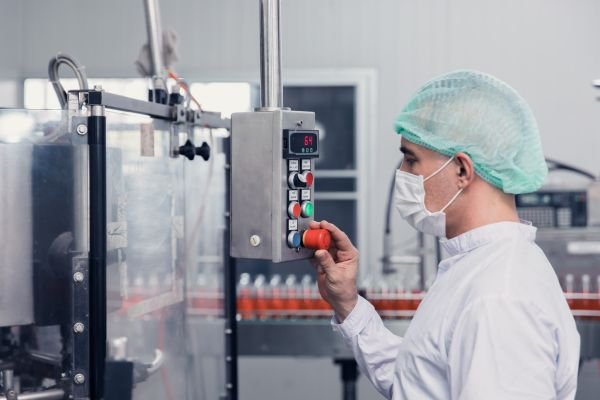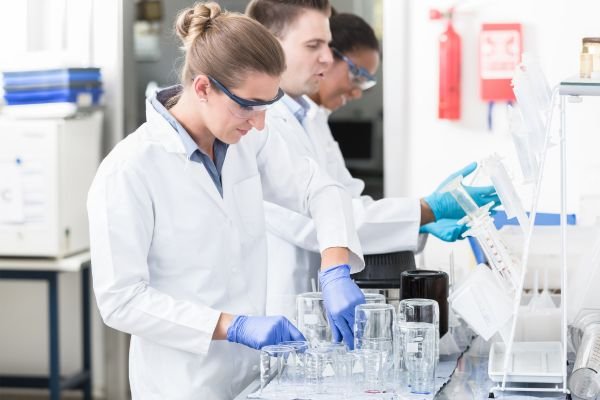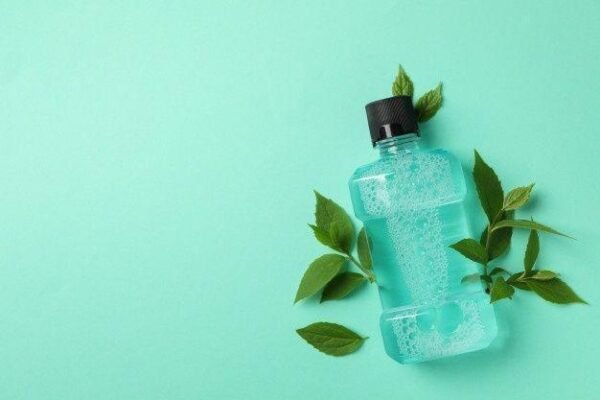การที่โรงงานผลิตผลิตภัณฑ์ดูแลสุขภาพช่องปากในเซี่ยงไฮ้ได้รับการยอมรับว่าเป็นผู้นำด้านการผลิตระดับโลกเมื่อเร็วๆ นี้ ได้ส่งผลกระทบอย่างมากต่ออุตสาหกรรม แม้ว่าความเร็วในการผลิตอันน่าทึ่ง เช่น การตอบสนองคำสั่งซื้ออีคอมเมิร์ซภายในไม่กี่วัน จะดึงดูดความสนใจ แต่ความจริงที่แท้จริงอยู่ที่การที่ผู้ผลิตชั้นนำ ผู้ผลิตน้ำยาบ้วนปาก บัดนี้ การผสมผสานระบบอัตโนมัติอัจฉริยะ ความคล่องตัวของห่วงโซ่อุปทาน และแนวทางปฏิบัติที่ยั่งยืน เพื่อนิยามความเป็นเลิศใหม่ สำหรับผู้ซื้อ B2B ที่กำลังมองหาพันธมิตรแบรนด์ส่วนตัวที่เชื่อถือได้ วิวัฒนาการนี้เน้นย้ำถึงเกณฑ์มาตรฐานสำคัญในการคัดเลือกซัพพลายเออร์ที่สามารถส่งมอบคุณภาพที่สม่ำเสมอ นวัตกรรม และการตอบสนองต่อตลาดในอุตสาหกรรมผลิตภัณฑ์ดูแลช่องปากที่มีการแข่งขันสูงในปัจจุบัน สำหรับผู้ซื้อ B2B ที่กำลังประเมินพันธมิตรในห่วงโซ่อุปทาน การระบุผู้ผลิตน้ำยาบ้วนปากที่เชื่อถือได้นั้นต้องอาศัยการตรวจสอบอย่างละเอียดถี่ถ้วนมากกว่าการรับรองขั้นพื้นฐาน แต่ต้องอาศัยความเข้าใจว่านวัตกรรมนั้นฝังรากลึกอยู่ในดีเอ็นเอการผลิตของพวกเขาอย่างไร.
การผลิตอัจฉริยะและความคล่องตัวของห่วงโซ่อุปทาน
ปัจจุบันผู้ผลิตน้ำยาบ้วนปากที่ก้าวหน้าได้ใช้ระบบวงจรปิดอัจฉริยะ ซึ่งเซ็นเซอร์ IoT จะคอยตรวจสอบและปรับระดับความหนืดและค่า pH โดยอัตโนมัติอย่างต่อเนื่อง ช่วยลดเวลาการเปลี่ยนถ่ายน้ำยาได้อย่างมากเมื่อเทียบกับวิธีการผลิตแบบเดิม ระบบการผลิตอัตโนมัติสมัยใหม่ไม่ใช่ทางเลือกสำหรับผู้ผลิตน้ำยาบ้วนปากชั้นนำอีกต่อไป โรงงานชั้นนำได้ผสานรวมกระบวนการผลิตแบบวงจรปิด ซึ่งเซ็นเซอร์แบบเรียลไทม์จะตรวจสอบตัวแปรสำคัญต่างๆ เช่น ความหนืดและระดับ pH ทำให้สามารถปรับค่าได้เองโดยไม่ต้องมีการแทรกแซงด้วยมือ การผสมผสานเทคโนโลยีการผลิตดิจิทัลที่ราบรื่นนี้ ตั้งแต่การคาดการณ์ความต้องการที่ขับเคลื่อนด้วย AI ไปจนถึงบรรจุภัณฑ์หุ่นยนต์ ช่วยให้สามารถสลับเปลี่ยนผลิตภัณฑ์ได้อย่างรวดเร็ว (เช่น สูตรปราศจากแอลกอฮอล์ ไปจนถึงบรรจุภัณฑ์ขนาดพกพา) ความสามารถด้านการผลิตที่ยืดหยุ่นเช่นนี้ช่วยให้พันธมิตรผู้ผลิตตามสัญญาสามารถรักษาระดับผลผลิตให้คงที่แม้ความต้องการจะผันผวน ซึ่งถือเป็นข้อได้เปรียบสำคัญสำหรับผู้จัดจำหน่ายที่บริหารจัดการเครือข่ายค้าปลีกขนาดใหญ่.
ความสามารถในการตอบสนองห่วงโซ่อุปทานยิ่งสร้างความแตกต่างให้กับผู้นำในอุตสาหกรรม ผู้ผลิตที่ก้าวหน้าได้นำกลยุทธ์โลจิสติกส์เชิงคาดการณ์มาใช้ โดยใช้การติดตามการขนส่งผ่านบล็อกเชนและคลังสินค้าระดับภูมิภาคเพื่อลดระยะเวลาดำเนินการ ด้วยการประสานข้อมูลการผลิตกับข้อมูลการขายแบบเรียลไทม์ ซึ่งเป็นเอกลักษณ์ของโรงงานที่ทันสมัย พวกเขาจึงสามารถเติมเต็มสินค้าได้อย่างรวดเร็วสำหรับลูกค้าแบรนด์ส่วนตัว ลดปัญหาสินค้าขาดสต็อก พร้อมทั้งรับประกันความสดใหม่ของสินค้าเมื่อส่งมอบ.
การผสานรวมการจำลองฝาแฝดดิจิทัลช่วยให้ผู้ผลิตสามารถทดสอบการปรับเปลี่ยนการผลิตได้แบบเสมือนจริง ลดเวลาหยุดทำงานและเพิ่มประสิทธิภาพเวิร์กโฟลว์ก่อนนำไปใช้งาน เทคโนโลยีนี้มีประโยชน์อย่างยิ่งสำหรับการผลิตน้ำยาบ้วนปากแบบเฉพาะบุคคล ซึ่งต้องปรับแต่งสูตรและเปลี่ยนแปลงบรรจุภัณฑ์โดยไม่กระทบต่อประสิทธิภาพโดยรวม โรงงานที่ใช้ประโยชน์จากนวัตกรรมเหล่านี้สามารถลดเวลาปรับเปลี่ยนการผลิตได้อย่างมาก ซึ่งเป็นปัจจัยสำคัญสำหรับผู้ซื้อแบบ B2B ที่ต้องการความรวดเร็วในการปรับเปลี่ยนผลิตภัณฑ์ตามฤดูกาลหรือผลิตภัณฑ์ที่ขับเคลื่อนด้วยเทรนด์.
นวัตกรรมผลิตภัณฑ์และความสามารถในการปรับแต่ง
นอกเหนือจากประสิทธิภาพแล้ว ผู้ผลิตผลิตภัณฑ์ดูแลช่องปากชั้นนำยังโดดเด่นด้วยการลงทุนด้านวิจัยและพัฒนาเชิงรุก โรงงานที่ทันสมัยมีห้องปฏิบัติการภายในที่ติดตั้งเครื่องมือต่างๆ เช่น เครื่องวิเคราะห์รสชาติอิเล็กทรอนิกส์และเครื่องทดสอบการละลาย เพื่อเพิ่มประสิทธิภาพประสิทธิภาพของส่วนผสม โครงสร้างพื้นฐานนี้ช่วยให้สามารถแปลงข้อมูลเชิงลึกของผู้บริโภคที่รวบรวมผ่านการวิเคราะห์แนวโน้มที่ขับเคลื่อนด้วย AI ไปสู่สูตรที่พร้อมจำหน่ายได้อย่างรวดเร็ว เช่น น้ำยาบ้วนปากผสมโปรไบโอติกเพื่อปรับสมดุลจุลินทรีย์ในลำไส้ หรือระบบสารกันบูดจากพืชสำหรับผลิตภัณฑ์ที่ใส่ใจสิ่งแวดล้อม.
ความแตกต่างที่แท้จริงมาจากการปรับแต่งตามสถานการณ์ ปัจจุบันพันธมิตร OEM ชั้นนำได้ออกแบบโซลูชันสำหรับกลุ่มตลาดเฉพาะ:
น้ำยาบ้วนปากที่เติมอิเล็กโทรไลต์สำหรับผู้ที่ชื่นชอบการออกกำลังกาย
สารสกัดเข้มข้นขนาดกะทัดรัดสำหรับการขายปลีกในการเดินทาง
บรรจุภัณฑ์ที่มีฉลากอักษรเบรลล์เพื่อให้เป็นไปตามข้อกำหนดด้านการเข้าถึง
ความยืดหยุ่นของการผลิตแบบเป็นล็อตเล็กดังกล่าวขยายออกไปนอกเหนือจากเคมีและนวัตกรรมบรรจุภัณฑ์ ช่วยให้แบรนด์ที่มีตราสินค้าของเอกชนสามารถเพิ่มความสวยงามบนชั้นวางได้โดยไม่กระทบต่อความปลอดภัยหรือความสามารถในการปรับขนาด.
การเพิ่มขึ้นของสูตรที่เป็นมิตรกับไมโครไบโอมสะท้อนให้เห็นถึงเทรนด์สำคัญอีกประการหนึ่ง ด้วยความสนใจที่เพิ่มขึ้นของผู้บริโภคต่อโพรไบโอติกส์ชนิดรับประทาน ผู้ผลิตจึงกำลังพัฒนาน้ำยาบ้วนปากที่ส่งเสริมแบคทีเรียที่มีประโยชน์ควบคู่ไปกับการกำจัดเชื้อโรคที่เป็นอันตราย การเปลี่ยนแปลงนี้สอดคล้องกับเทรนด์สุขภาพโดยรวมที่ผู้ซื้อ B2B มองหาผลิตภัณฑ์ที่ผสานเข้ากับกิจวัตรสุขภาพแบบองค์รวมได้อย่างลงตัว ความต้องการที่เพิ่มขึ้นสำหรับ น้ำยาบ้วนปากไซลิทอล สะท้อนให้เห็นถึงความต้องการของผู้บริโภคสำหรับสารให้ความหวานจากธรรมชาติที่ช่วยรักษาสมดุลของจุลินทรีย์ในช่องปาก.

ความเชี่ยวชาญด้านการประกันคุณภาพและกฎระเบียบ
การกำกับดูแลคุณภาพระดับเภสัชกรรมเป็นรากฐานสำคัญของการผลิตน้ำยาบ้วนปากที่มีชื่อเสียง โรงงานผลิตชั้นนำได้นำระบบตรวจสอบย้อนกลับแบบครบวงจรมาใช้ ติดตามส่วนผสมตั้งแต่การรับสินค้าจนถึงการบรรจุ เทคโนโลยีการตรวจสอบอัตโนมัติ เช่น ระบบวิชั่นความละเอียดสูง ช่วยสกัดกั้นข้อบกพร่องก่อนการจัดส่ง เพื่อให้แน่ใจว่าทุกหน่วยผลิตเป็นไปตามข้อกำหนดบนฉลาก และรักษาความสมบูรณ์ของแบรนด์สำหรับความร่วมมือแบบไวท์เลเบล.
การปฏิบัติตามข้อกำหนดระดับโลกต้องอาศัยความรู้เฉพาะทาง ผู้ผลิตตามสัญญาชั้นนำสามารถบริหารจัดการกฎระเบียบที่หลากหลายได้อย่างเชี่ยวชาญ ไม่ว่าจะเป็นการปฏิบัติตามมาตรฐานเครื่องสำอางระดับภูมิภาคหรือการรับรองความปลอดภัย ซึ่งรวมถึงการรักษาเอกสารเกี่ยวกับความปลอดภัยของส่วนผสม แนวปฏิบัติที่ดีที่สุดด้านการผลิตในปัจจุบัน และการเปิดเผยข้อมูลด้านความยั่งยืน พันธมิตรที่โดดเด่นในที่นี้จึงกลายเป็นสิ่งที่ขาดไม่ได้สำหรับแบรนด์ต่างๆ ที่กำลังขยายธุรกิจไปทั่วโลก.
วิวัฒนาการของมาตรฐานสากลสำหรับน้ำยาบ้วนปากตอกย้ำถึงความสำคัญที่เพิ่มขึ้นของมาตรฐานคุณภาพมาตรฐานในการผลิต ผู้ผลิตที่ปฏิบัติตามแนวทางเหล่านี้แสดงให้เห็นถึงความมุ่งมั่นในการปฏิบัติด้านการผลิตที่โปร่งใส ซึ่งเป็นปัจจัยสำคัญที่เพิ่มมากขึ้นสำหรับผู้ซื้อ B2B ที่ให้ความสำคัญกับความรับผิดชอบต่อห่วงโซ่อุปทาน สำหรับสูตรเฉพาะทางเช่น น้ำยาบ้วนปากฟลูออไรด์, ผู้ผลิตต้องดำเนินการทดสอบความคงตัวเพิ่มเติมเพื่อให้มั่นใจถึงประสิทธิภาพของส่วนผสมสำคัญตลอดวงจรชีวิตของผลิตภัณฑ์ การตรวจสอบย้อนกลับระดับเภสัชกรรมเป็นสิ่งที่ผู้ผลิตน้ำยาบ้วนปาก OEM รายใดก็ตามที่ต้องการให้บริการในตลาดที่มีการควบคุม จำเป็นต้องมีการตรวจสอบย้อนกลับด้วยบล็อกเชน ส่วนผสมที่ติดตามด้วยบล็อกเชนช่วยให้มั่นใจถึงความสม่ำเสมอของการผลิตในแต่ละชุด.
ความยั่งยืนเป็นข้อได้เปรียบในการแข่งขัน
ปัจจุบันความรับผิดชอบต่อสิ่งแวดล้อมคือนิยามความเป็นผู้นำด้านการผลิต โรงงานที่ก้าวหน้าได้นำแนวคิดริเริ่มการลดขยะเป็นศูนย์มาใช้ เช่น ระบบกู้คืนตัวทำละลายที่นำเอทานอลกลับมาใช้ใหม่ระหว่างการผสม ควบคู่ไปกับกระบวนการประหยัดพลังงานที่ใช้พลังงานหมุนเวียน นวัตกรรมบรรจุภัณฑ์ เช่น ขวดที่ย่อยสลายได้ทางชีวภาพหรือซองเติม ช่วยลดขยะพลาสติก ในขณะเดียวกันก็ตอบสนองความคาดหวังของผู้ซื้อ B2B ในเรื่องห่วงโซ่อุปทานที่เป็นมิตรต่อสิ่งแวดล้อม.
รูปแบบเศรษฐกิจหมุนเวียนช่วยยกระดับความร่วมมือให้สูงขึ้น ตัวอย่างเช่น
การรีไซเคิลน้ำในกระบวนการทำความสะอาด
โปรแกรมรับคืนบรรจุภัณฑ์
การจัดหาพืชจากฟาร์มออร์แกนิกที่ได้รับการรับรอง
โครงการริเริ่มเหล่านี้ช่วยให้ผู้จัดจำหน่ายบรรลุเป้าหมายด้านความยั่งยืนพร้อมทั้งสอดคล้องกับค่านิยมของผู้บริโภคปลายทาง.
การเปลี่ยนมาใช้สารกันบูดจากพืชและสูตรฉลากสะอาด (Clean-label) สะท้อนให้เห็นถึงความเคลื่อนไหวของอุตสาหกรรมในวงกว้างมากขึ้น ผู้ผลิตที่ลงทุนในเคมีสีเขียววางตำแหน่งตัวเองให้เป็นพันธมิตรที่แบรนด์ต่างๆ ให้ความสำคัญเป็นอันดับแรก โดยเฉพาะอย่างยิ่งกับผู้พัฒนาผลิตภัณฑ์ตราสินค้าเอกชนในภูมิภาคที่มีกฎระเบียบด้านความยั่งยืนที่เข้มงวด เช่น สหภาพยุโรปและอเมริกาเหนือ.

การเตรียมพร้อมสำหรับอนาคตด้วยเทคโนโลยีและการแปลเป็นภาษาท้องถิ่น
ขอบเขตต่อไปอยู่ที่ความร่วมมือระหว่างมนุษย์และเครื่องจักร การพัฒนาสูตรโดยใช้ AI ช่วยรักษาเสถียรภาพของต้นทุนท่ามกลางความผันผวนของวัตถุดิบโดยไม่กระทบต่อประสิทธิภาพ การเติบโตของศูนย์กลางการผลิตในภูมิภาคจะได้รับความสนใจมากขึ้น โดยผสานความสามารถในการปรับตัวสำหรับการผลิตแบบล็อตเล็กเข้ากับการวิจัยและพัฒนาแบบรวมศูนย์ เพื่อให้บริการตลาดท้องถิ่นได้รวดเร็วยิ่งขึ้น พร้อมกับลดความเสี่ยงทางภูมิรัฐศาสตร์.
การบูรณาการด้านความปลอดภัยทางไซเบอร์มีความสำคัญอย่างยิ่งยวดเมื่อการเชื่อมต่อมีความแข็งแกร่งยิ่งขึ้น การยึดมั่นในกรอบความปลอดภัยทางอุตสาหกรรมช่วยปกป้องทรัพย์สินทางปัญญาและความต่อเนื่องของการผลิต ซึ่งเป็นหลักประกันสำคัญสำหรับลูกค้า B2B ที่ไว้วางใจให้พันธมิตรด้านการผลิตใช้สูตรเฉพาะของตน.
เทคโนโลยีใหม่ๆ เช่น นาโนบอทที่ควบคุมด้วยแม่เหล็ก ซึ่งกำลังอยู่ในระหว่างการพัฒนาเพื่อแก้ปัญหาอาการเสียวฟัน ชี้ให้เห็นถึงนวัตกรรมการดูแลสุขภาพช่องปากในอนาคต แม้ว่าจะยังไม่สามารถนำไปใช้กับการผลิตน้ำยาบ้วนปากในตลาดมวลชนได้ แต่ความก้าวหน้าดังกล่าวก็ตอกย้ำถึงความสำคัญของการร่วมมือกับผู้ผลิตที่มุ่งมั่นในการลงทุนด้านการวิจัยและพัฒนาในระยะยาว เมื่อการพัฒนาในระดับท้องถิ่นกำลังได้รับความนิยมมากขึ้น ผู้ผลิตน้ำยาบ้วนปากที่คล่องตัวรายนี้จะใช้ประโยชน์จากศูนย์กลางระดับภูมิภาคเพื่อตอบสนองต่อการผลิตในปริมาณน้อย ในขณะเดียวกันก็ยังคงรักษาความเข้มข้นของการวิจัยและพัฒนาแบบรวมศูนย์ไว้.
บทสรุป: มาตรฐานใหม่ด้านความเป็นเลิศในการผลิต
ผู้ผลิตน้ำยาบ้วนปากชั้นนำในปัจจุบันดำเนินงานเสมือนระบบนิเวศแบบบูรณาการที่มาตรฐานการผลิตที่ได้รับการรับรองผสานรวมกับความคล่องตัวที่ขับเคลื่อนโดยผู้บริโภค พวกเขาเปลี่ยนความท้าทาย ไม่ว่าจะเป็นความผันผวนของอุปสงค์ ความซับซ้อนของกฎระเบียบ หรือข้อกำหนดด้านความยั่งยืน ให้เป็นโอกาสในการทำงานร่วมกันแบบ B2B ดังจะเห็นได้จากโรงงานชั้นนำที่นิยามการตอบสนองแบบใหม่ ความเป็นเลิศในปัจจุบันครอบคลุมถึงความคล่องแคล่วทางดิจิทัล ความเชี่ยวชาญด้านกฎระเบียบ และการดำเนินงานอย่างมีจริยธรรม สำหรับผู้พัฒนาและผู้จัดจำหน่ายผลิตภัณฑ์ตราสินค้าเฉพาะ การคัดเลือกพันธมิตรที่โดดเด่นในสามสิ่งนี้ไม่ได้เป็นเพียงการจัดหาเชิงกลยุทธ์เท่านั้น แต่ยังเป็นรากฐานของการสร้างแบรนด์ผลิตภัณฑ์ดูแลช่องปากที่สามารถแข่งขันได้และพร้อมสำหรับอนาคต ในด้านการผลิต คุณภาพไม่ได้วัดจากผลผลิตเพียงอย่างเดียวอีกต่อไป แต่ยังวัดจากการปรับตัวของการผลิตให้สอดคล้องกับความต้องการในอนาคตได้อย่างราบรื่น.







